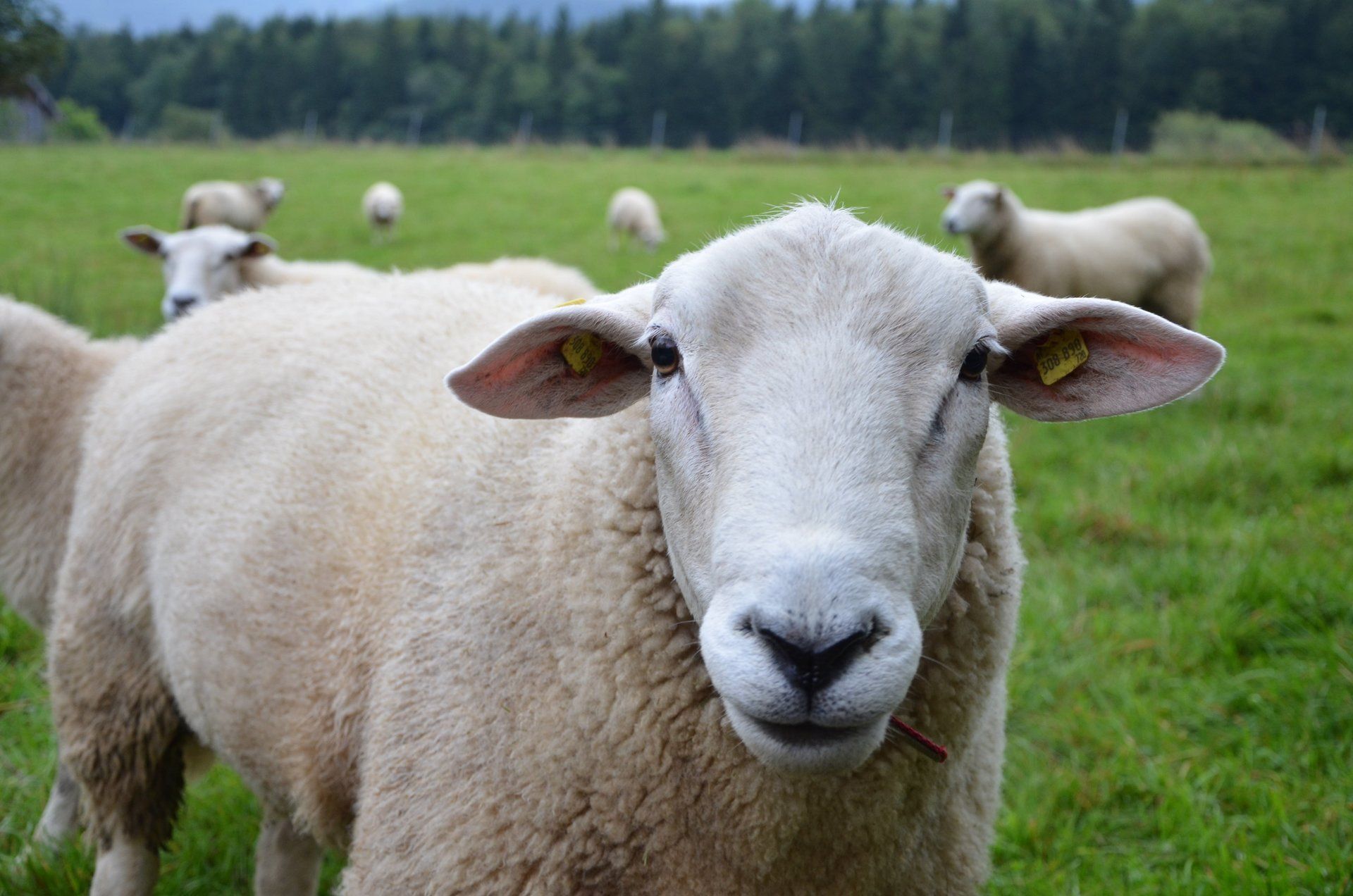
For around 30 years we have been producing high-quality, healthy lamb from our organic sheep farm for the Original Salt Burger ™ in the family business
As a well-known regional supplier and member of the Upper Austrian Zuchtverband, we are the epitome of original quality in processing and sales.
AkWe currently offer our holiday guests our products in the shop https://shop.fischergut.at
Our products: our SHEEP-Burger ™ is an original and tastes really delicious!

Bio Regional
= Optimal
Our purity law: 100% genuine, 100% sheep, 100% organic and only the best ingredients, preferably from our region.
Not more but also not less. Our word on it.

Healthy lamb and
Sheep meat
Sheep meat is one of the healthiest types of meat. It achieves top values for valuable nutrients such as essential fatty acids, vitamins and minerals - and it is also low in fat.

TOP quality
product
Quality meat from organic-certified partner companies with a focus on slow growth and sustainable production. Animals are kept here in a species-appropriate and environmentally friendly manner.

30 years
Experience
Experience
For at least 30 years our partner companies like the FiSCHERGUT in St. Wolfgang have been producing high quality and healthy sheep meat.
The original Sheep-Burger ™ from Sankt Wolfgang. The history.
The story of salt in the Salzkammergut began 3,000 years ago when the first tunnels were "dug on Halstadt on a Saltzberg" - in today's UNESCO World Heritage Site - in the city of Hallstatt.
We asked ourselves what could be more obvious than bringing together the 3,000-year history of the region with the 30-year family tradition - Texel sheep breeding. The result: the original Salzkammergut Sheep-Burger ™ "the salt burger with regional reference".
In intensive years of preparation and development, we have succeeded in the truest sense of the word with an excellent quality "slow food" product. Read here about our quality of processing and preparation of our healthy sheep meat and let us convince you of our products, which as real craft do not fit into our industrialized world.
Thank you for your order in the Sheep-Burger Shop and your trust in our original quality!
In intensive years of preparation and development, we have succeeded in the truest sense of the word with an excellent quality "slow food" product. Read here about our quality of processing and preparation of our healthy sheep meat and let us convince you of our products, which as real craft do not fit into our industrialized world.
Thank you for your order in the Sheep-Burger Shop and your trust in our original quality!
Uncompromisingly consistent. Sheep-Burger ™ quality guarantee.
Strict requirements for suppliers and producers. One of the requirements that we make for our suppliers and producers is a consistent, natural keeping of the sheep, as we ourselves have been successfully doing for 30 years. This means that the animals graze outdoors most of the year and are only stabled in the winter months when the pastures are covered with snow and ice.
Our sheep graze extensively - this means that the pastures are not fertilized. The sheep only find the food that nature has in store for them and that grows back year after year. We attach great importance to long grazing periods, because the consumption of fresh grass and plants and exercise in the pasture means that the sheep produce meat that has a particularly high concentration of healthy ingredients.
Refrain from feeding soy or maize or even industrially produced animal feed. We can only guarantee the slow growth of our sheep through extensive grazing and by not adding growth-promoting substances such as antibiotics and hormones.
Our claim to sustainable animal husbandry: natural, species-appropriate, dignified.
Our sheep grow as fast as nature intended - neither faster nor slower. We reject a forced rapid growth, as it is achieved in conventional agriculture through the massive use of growth-promoting substances. Because this forced "turbo-growth" not only leads to massive health problems for the sheep, but also harms people who consume antibiotics and hormones that are fed in conventional agriculture when eating sheep meat.
We also show respect for animals as fellow creatures during slaughter. It is important to us that slaughter is not an undignified, industrialized process, but that the sheep are fearless at the moment of slaughter. Farm animals are also creatures, and that's how we treat them.
100% real. 100% sheep. 100% organic. The best natural and regional ingredients.
When processing the slaughtered meat to make the Salzkammergut Sheep-Burger, only regional ingredients are used - such as the best saline salt. By avoiding long transport routes, this not only protects the environment, but also contributes to the inimitable Salzkammergut aroma of our sheep burger, as does the fact that our sheep have lived exclusively on local grasses and plants on our pastures throughout their lives.
As with the food for our animals, the same applies to the ingredients for the Salzkammergut Sheep-Burger that industrially produced additives are completely taboo! We do not use any chemical additives, refined, bleached or hardened industrial fats and also no glutamate. And finally, we do not use any artificial flavor enhancers, because our high-quality Salzkammergut Sheep-Burger already has such an intense natural aroma that we are happy to forego the tricks that are common in industrial animal production to create "taste" be able!
Quality & Certifications

Bio Regional = Optimal
Our purity law: 100% sheep, 100% organic and only the best regional ingredients. No more but also no less less. Our word on it. As an organic conversion company, we produce slowly grown quality meat in which the animals are kept in a species-appropriate and environmentally friendly manner.

Healthy sheep meat
Sheep meat is one of the healthiest types of meat available on the market. This can also be proven scientifically, because it achieves top values for valuable nutrients such as essential fatty acids, vitamins and minerals - and it is also low in fat.

Real products are also genuinely made without genetic engineering.
This is how our food and feed remain GM-free: Austria’s retailers, food manufacturers and agriculture are pioneers across Europe - more than 2,200 products already bear the quality mark "Manufactured without genetic engineering". This will also enable free choice when shopping for groceries in the future.

Our quality guarantee: animals from healthy free-range rearing.
In contrast to land sheep breeds, meat sheep breeds have particularly well-developed muscles. They are mainly used in the production of quality lambs.
The most important representatives are the Texel sheep, the black-headed meat sheep and the Suffolk. At FiSCHERGUT, we particularly value long grazing periods. Therefore, our meat has a higher concentration of healthy ingredients.
Texel sheep lamb seasonally, ie the mother animals only give birth to lambs once a year, between December and March. That is why we only offer fresh, premium lamb from Texel sheep from our own production in autumn. You can find recipes for a successful preparation here.
Our sheep are raised and kept extensively outdoors almost all year round, without any additional feeding or antibiotics. Only in the winter months are the sheep stabled and supplied with hay from our own meadows.
Order our natural sheep burgers here for connoisseurs!
Sheep Meat & Health
challenge
Sheep meat from organic, sustainable production is one of the healthiest types of meat available on the market. The high quality of sheep meat can also be determined scientifically, because in all known comparative studies it achieves top values for valuable nutrients such as essential fatty acids, vitamins and minerals - and it is also low in fat.
Top values for the valuable nutrients
According to all known scientific studies, vitamins and minerals are demonstrably higher in sheep meat from ecological and sustainable production than in livestock from industrial animal production. The reason for this is obvious - because when sheep graze naturally instead of being fed only with industrially prepared and premixed feed, they also consume grasses and plants that would otherwise be withheld from them. It is thanks to this “aselective”, i.e. not fussy, grazing behavior that sheep that are kept in natural grassland grazing consume valuable nutrients that would otherwise be withheld from them.
Vitamins, minerals and trace elements in abundance
In the meat of freely grazing sheep and lambs, particularly high concentrations of valuable minerals and trace elements as well as high-quality protein are found. A number of vital vitamins (A, B1, B2, B6, B12, B13 and D) are also found in particularly high concentrations in free-range sheep. This applies in particular to vitamin B13, the so-called orotic acid. It is used for the internal cell metabolism, stimulates the formation of blood cells in the bone marrow and regenerates damaged liver cells. Orotic acid also contributes to the development of cancer-inhibiting substances - its consumption is therefore a good preventive measure against cancer.
High concentration of unsaturated fatty acids
Sheep meat from natural grassland grazing also achieved the highest concentration of unsaturated fatty acids, such as omega-3 fatty acids, in comparative studies. The reason for this is seen in the fact that the growth rate in free-range sheep is significantly slower than in farm animals, which should be brought to slaughter maturity as quickly as possible with growth hormones. Free-range sheep are therefore low in intramuscular fat and their tissues have a higher concentration of unsaturated fatty acids. Unsaturated fatty acids play a particularly important role in human nutrition, because their sufficient presence is one of the key factors responsible for a functioning metabolism. If the human body does not receive enough unsaturated fatty acids, the metabolism is disturbed. Unsaturated fatty acids also lower the cholesterol level in the blood and thus prevent cardiovascular diseases.
High in L-carnitine
L-carnitine also occurs in particularly large quantities in sheep meat. The measured values are three times as high as for beef and even seven times as high as for pork. L-carnitine is a protein compound made from the essential, proteinogenic amino acids lysine and methinonine. It promotes the burning of fat and thus has a performance-enhancing effect. A positive effect was also observed in coronary heart disease. L-carnitine also increases glucose tolerance in diabetics, and in dialysis patients an adequate supply of L-carnitine can significantly reduce the need for EPO.
Fit and enduring thanks to conjugated linoleic acid
Free-range sheep meat is particularly rich in what is known as conjugated linoleic acid (CLA). The basic substance of CLA, linoleic acid, can be found in numerous plants and grasses that grow on local pastures. CLA is a polyunsaturated fatty acid that has a number of scientifically proven positive effects on the human body. The CLA has a cancer-inhibiting effect and protects against the development or intensification of arteriosclerotic changes in the heart. The CLA also brings about a positive change in the composition of the human body in terms of fat and muscles, because it burns body fat and at the same time promotes muscle building. In addition, the CLA improves the aerobic endurance performance of the organism, i.e. its ability to regenerate after a heavy load, such as that caused by intensive sporting activity or hard physical work. According to more recent findings, the CLA ultimately also makes an important contribution to normalizing the blood sugar level and thus to preventing adult-onset diabetes.
Better than any CLA supplement
Because of its positive effect on fat burning, muscle building and aerobic endurance, the CLA is also valued by competitive athletes. Not least among strength athletes and bodybuilders, CLA supplements have enjoyed great popularity for several years. Experts like Prof. Dr. Gerhard Jahreis from the Institute for Nutritional Sciences at the Friedrich Schiller University in Jena (Germany), however. The renowned nutritionist told the Upper Austrian Sheep Breeding and Sheep Farming Association in Linz that the CLA preparations currently available on the open market contain so-called CLA isomers, i.e. modified CLA that are not yet known how they affect the human organism works. Professor Jahreis expressly confirmed that CLA has a positive effect on the human organism - and at the same time pointed out that the average consumption of CLA in most people is too low to meet the body's needs. In Germany, for example, the average consumption would be 350 milligrams, which is only a third of the recommended amount. However, the requirement can be met in full without additional chemical preparations if sufficient foods are consumed that are rich in CLA - such as sheep and lamb.
Sources for the statements of Professor Jahreis:
http://www.schafe-ooe.at/gesund-bleiben-mit-schafprodukte/3-gesund-bleiben-mit-schafprodukte/30-was-taugen-cla-praeparate.html
http://www.schafe-ooe.at/gesund-bleiben-mit-schafprodukte/3-gesund-bleiben-mit-schafprodukte/29-wieviel-cla-brauch-der-mensch.html
Top values for the valuable nutrients
According to all known scientific studies, vitamins and minerals are demonstrably higher in sheep meat from ecological and sustainable production than in livestock from industrial animal production. The reason for this is obvious - because when sheep graze naturally instead of being fed only with industrially prepared and premixed feed, they also consume grasses and plants that would otherwise be withheld from them. It is thanks to this “aselective”, i.e. not fussy, grazing behavior that sheep that are kept in natural grassland grazing consume valuable nutrients that would otherwise be withheld from them.
Vitamins, minerals and trace elements in abundance
In the meat of freely grazing sheep and lambs, particularly high concentrations of valuable minerals and trace elements as well as high-quality protein are found. A number of vital vitamins (A, B1, B2, B6, B12, B13 and D) are also found in particularly high concentrations in free-range sheep. This applies in particular to vitamin B13, the so-called orotic acid. It is used for the internal cell metabolism, stimulates the formation of blood cells in the bone marrow and regenerates damaged liver cells. Orotic acid also contributes to the development of cancer-inhibiting substances - its consumption is therefore a good preventive measure against cancer.
High concentration of unsaturated fatty acids
Sheep meat from natural grassland grazing also achieved the highest concentration of unsaturated fatty acids, such as omega-3 fatty acids, in comparative studies. The reason for this is seen in the fact that the growth rate in free-range sheep is significantly slower than in farm animals, which should be brought to slaughter maturity as quickly as possible with growth hormones. Free-range sheep are therefore low in intramuscular fat and their tissues have a higher concentration of unsaturated fatty acids. Unsaturated fatty acids play a particularly important role in human nutrition, because their sufficient presence is one of the key factors responsible for a functioning metabolism. If the human body does not receive enough unsaturated fatty acids, the metabolism is disturbed. Unsaturated fatty acids also lower the cholesterol level in the blood and thus prevent cardiovascular diseases.
High in L-carnitine
L-carnitine also occurs in particularly large quantities in sheep meat. The measured values are three times as high as for beef and even seven times as high as for pork. L-carnitine is a protein compound made from the essential, proteinogenic amino acids lysine and methinonine. It promotes the burning of fat and thus has a performance-enhancing effect. A positive effect was also observed in coronary heart disease. L-carnitine also increases glucose tolerance in diabetics, and in dialysis patients an adequate supply of L-carnitine can significantly reduce the need for EPO.
Fit and enduring thanks to conjugated linoleic acid
Free-range sheep meat is particularly rich in what is known as conjugated linoleic acid (CLA). The basic substance of CLA, linoleic acid, can be found in numerous plants and grasses that grow on local pastures. CLA is a polyunsaturated fatty acid that has a number of scientifically proven positive effects on the human body. The CLA has a cancer-inhibiting effect and protects against the development or intensification of arteriosclerotic changes in the heart. The CLA also brings about a positive change in the composition of the human body in terms of fat and muscles, because it burns body fat and at the same time promotes muscle building. In addition, the CLA improves the aerobic endurance performance of the organism, i.e. its ability to regenerate after a heavy load, such as that caused by intensive sporting activity or hard physical work. According to more recent findings, the CLA ultimately also makes an important contribution to normalizing the blood sugar level and thus to preventing adult-onset diabetes.
Better than any CLA supplement
Because of its positive effect on fat burning, muscle building and aerobic endurance, the CLA is also valued by competitive athletes. Not least among strength athletes and bodybuilders, CLA supplements have enjoyed great popularity for several years. Experts like Prof. Dr. Gerhard Jahreis from the Institute for Nutritional Sciences at the Friedrich Schiller University in Jena (Germany), however. The renowned nutritionist told the Upper Austrian Sheep Breeding and Sheep Farming Association in Linz that the CLA preparations currently available on the open market contain so-called CLA isomers, i.e. modified CLA that are not yet known how they affect the human organism works. Professor Jahreis expressly confirmed that CLA has a positive effect on the human organism - and at the same time pointed out that the average consumption of CLA in most people is too low to meet the body's needs. In Germany, for example, the average consumption would be 350 milligrams, which is only a third of the recommended amount. However, the requirement can be met in full without additional chemical preparations if sufficient foods are consumed that are rich in CLA - such as sheep and lamb.
Sources for the statements of Professor Jahreis:
http://www.schafe-ooe.at/gesund-bleiben-mit-schafprodukte/3-gesund-bleiben-mit-schafprodukte/30-was-taugen-cla-praeparate.html
http://www.schafe-ooe.at/gesund-bleiben-mit-schafprodukte/3-gesund-bleiben-mit-schafprodukte/29-wieviel-cla-brauch-der-mensch.html


































